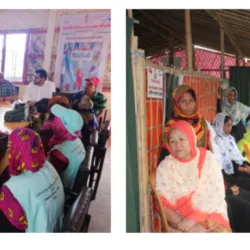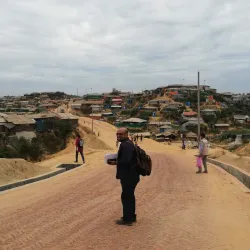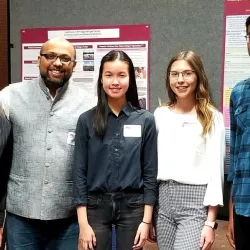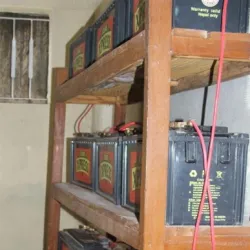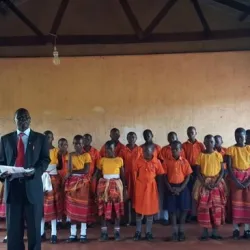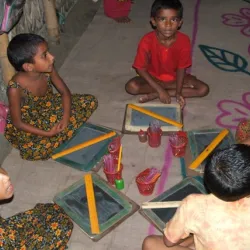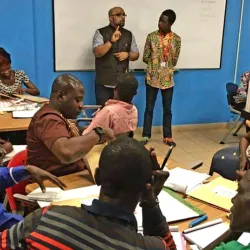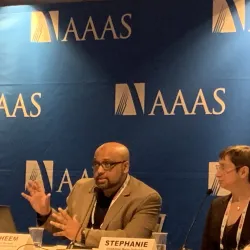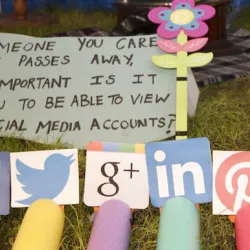Faheem Hussain
-
Room 256J Interdisciplinary B, 1120 South Cady Mall Tempe, AZ 85287-5603
-
Mail code: 6002Campus: Tempe
-
Faheem Hussain has more than 15 years of experience conducting socio-economic development and technological interventions related research in Asia, sub-Saharan Africa and North America. He is currently working as an assistant professor in the School for the Future of Innovation in Society (SFIS) at Arizona State University (ASU), USA. Hussain is also the chair of the Master of Science in Global Technology and Development program at SFIS. He holds a doctorate and an master's degree in engineering and public policy from Carnegie Mellon University. His research interests include digital solutions for refugees, information and communication technology for sustainable development, digital afterlife, social media, digital rights, gender empowerment using STEM, and sustainable development goals.
Before joining ASU, he worked as an assistant professor in the Department of Technology and Society, College of Engineering and Applied Sciences at State University of New York (SUNY), Korea. Hussain also worked as a founding faculty in Asian University for Women in Bangladesh and taught at Carnegie Mellon University’s Qatar Campus.
Beyond academia, Hussain works as a Technology Policy Specialist in various research projects with UN-ESCAP/APCICT, USAID, international development agencies (e.g., IDRC, DFID, Ford and Rockefeller Foundation), and international think tanks (e.g., Freedom House, LIRNEasia, Ideacorps) in the fields of technology, public policy and development. He is also a senior sustainability scientist in the School of Sustainability at ASU.
(Email: faheem.hussain@asu.edu)
Degree:
- Ph.D. Engineering and Public Policy, Carnegie Mellon University
- M.Sc. Engineering and Public Policy, Carnegie Mellon University
- M.Sc. Telecommunications Management, Oklahoma State University
- B.Sc. Computer Science, University of Dhaka
Development for Displaced Population, Information and Communication Technology for Development (ICT4D), Digital Afterlife, Social Media, Digital Rights, Telecommunication Policy, ICT Entrepreneurship, Gender Empowerment using STEM, Sustainable Development Goals.
The principal components of Faheem Hussain's present research encompass evidence-based research on the multidimensional effects of Technology in Society. Faheem Hussain has been involved as a Technology Policy Specialist in various research projects with a number of United Nations organizations (e.g., UNDP, ITU, UN-APCICT), international development agencies (e.g., IDRC, DFID, Ford and Rockefeller Foundation), and international think tanks (e.g., Freedom House, LIRNEasia, Ideacorps) in the fields of Technology, Public Policy, and Development.
Journals
F. Hussain (2020). From Persecution to "Prosperity": Struggles, Aspirations, and Innovations among Rohingya Refugees in Digital Entrepreneurship. Work in progress. Selected to be published in Special Issue on Refugees and Digital Work at Development and Change (End of 2020)
F. Hussain and Y. Lee (2020). Can the displaced people dream for democracy? A case study on Rohingyas’ struggles and innovations for political mobilization in the digital space. Work in progress. Selected to be published in Special Issue: The contours of digital democracy in Asia in Asiascape: Digital Asia
F. Hussain and S. Brown (2018). Developing a comparative framework of ICT4D initiatives in the global South: A critical realist approach. Electronic Journal of Information Systems in Developing Countries (EJISDC). 2018; e12055. https://doi.org/10.1002/isd2.12055
F. Hussain and S. N. Amin (2018). ‘I don’t care about their reactions’: agency and ICTs in women’s empowerment in Afghanistan, Gender & Development, 26:2, 249-265, DOI: 10.1080/13552074.2018.1475924
F. Hussain and M. Mostafa (2016). “Digital Contradictions in Bangladesh: Encouragement, and Deterrence, of Citizen Engagement via ICTs”, Information Technologies and International Development Journal, Special Issue, 2016.
F. Hussain and S. Ullah (2013). “Mobile Communication and Internet in Bangladesh: Is Privacy at Risk for Youth Population?”, Media Watch, Centre for Communication Studies, May, 2013.
F. Hussain and R. Tongia (2010). “A Framework and Case Example for Evaluating Cost-Effectiveness of Information Services Across Technologies”, Information Technologies and International Development Journal, Special Issue (Vol. 6, Issue 2, 2010).
F. Hussain (2008). “Quest for a Sustainable Community Radio Broadcasting in Nepal: Practices, Prospects and Problems”, Global Media Journal, Australian Edition (2008).
F. Hussain, “An Overview of Telecommunications Regulatory Environment in Bangladesh”, Journal of Computer Science, Dhaka University (Annual issue, 2005).
Book Chapters
F. Hussain and Suzana Brown (2017), "Information Ecology as a Framework for South-South Cooperation: Case Studies of Rwanda and Bangladesh ICT-Based Health Applications". In: Choudrie J., Islam M., Wahid F., Bass J., Pr iyatma J. (eds) Information and Communication Technologies for Development. ICT4D 2017. IFIP Advances in Information and Communication Technology, vol 504. Springer, Cham.
F.Hussain (2016), "Women's Empowerment, SDGs and ICT, Core Module 1". Book Chapter in Women ICT Frontier Initiative (WIFI). Published by United Nations Asian and Pacific Training Centre for Information and Communication Technology for Development, Incheon, Republic of Korea.
F.Hussain (2016), "Enabling Role of ICT for Women Entrepreneurs, Core Module 2". Book Chapter in Women ICT Frontier Initiative (WIFI). Published by United Nations Asian and Pacific Training Centre for Information and Communication Technology for Development, Incheon, Republic of Korea.
F. Hussain and M. Mostafa (2015). “Political Micro-blogging in Global South: A Case Study of Twitter in the “Shahbag Movement”. Book Chapter in ICTs in Developing Country: Research, Practices & Policy Implications. B. L. Dey, K. Sorour, and R. Fillieri (Editors), Palgrave Macmillan, UK.
S. N. Amin, V. Ganepola, F. Hussain, S. Kaiser, and M. Mostafa (2015). "Impact of conducting gender research on the researchers in the context of Muslim communities in developing countries". Book Chapter in Journal Advances in Gender Research, Special Issue on "At the centre: Feminism, Social Science and Knowledge", Volume 20. M.T. Segal (Editor), Emerald, USA.
Peer-Reviewed Conferences (selected)
F. Hussain, P.J. Wall, R. Heeks. "Digital Innovation by Displaced Population: A Critical Realist search for Mechanisms in Rohingya Refugee camps in Bangladesh". 2020 IFIP WG 9.4 European Conference on the Social Implications of Computers in Developing Countries, Manchester, U.K., June 10-11, 2020
F. Hussain, A. H. Safir, D. Sabie, Z. Jahangir, and S. I. Ahmed.. 2020. Infrastructuring Hope: Solidarity, Leadership, Negotiation, and ICT among the Rohingya Refugees in Bangladesh. In Proceedings of the 2020 International Conference on Information and Communication Technologies and Development (ICTD2020). Association for Computing Machinery, New York, NY, USA, Article 12, 1–12. DOI:https://doi.org/10.1145/3392561.3394640
F. Hussain, Z. Jahangir, and A.H. Safir, “Rethinking Access to Information: The Missing Links and Undiscussed Questions of Exclusion in Rohingya Camps”, International Conference on Rohingya Crisis in Bangladesh: Challenges and Sustainable Solutions, North South University, Bangladesh, July 27-28, 2019
F. Hussain, Z. Jahangir, and A.H. Safir, “Evaluating the Impact of Fake News on Displaced Population: Experience with Rohingya Refugees from Myanmar”, International Conference on the Rohingya Crisis in Comparative Perspective, University College London (UCL), UK, July 4-5, 2019
F. Hussain and A. Karim, "'When will you start teaching the REAL curriculum?'- Challenges and Innovations in Education for Rohingya Refugees", 15th IFIP Conference on Social Implications of Computers in Developing Countries, Tanzania, May 1-3, 2019
F. Hussain and S. Brown, "Refugees and ICTs: Identifying the Key Trends and Gaps in Peer-reviewed Scholarship", 15th IFIP Conference on Social Implications of Computers in Developing Countries, Tanzania, May 1-3, 2019
F. Hussain, M. Mostafa, and D. Usmonova. 2017. Digital Walking Dead: How Safe is the Global South? In Proceedings of the Ninth International Conference on Information and Communication Technologies and Development (ICTD '17). Association for Computing Machinery, New York, NY, USA, Article 28, 1–5. DOI:https://doi.org/10.1145/3136560.3136593
F. Hussain, S. N. Amin, M. Mostafa, " Agency and ICT in Women’s Empowerment: Experiences from Afghanistan", Communication Policy Research (CPR) South 2016 Conference by LIRNEasia and Research ICT Africa, Zanzibar, Tanzania, September 8-10, 2016
F. Hussain and S. Brown, " South-South Cooperation: Can Rwanda's Community Health Service Learn From Bangladeshi Info Lady", Information and Communication Technologies and Development (ICTD) 2016, University of Michigan, Ann Arbor, Michigan, USA
F. Hussain and P. Zander, " Impacting on Gender Equality through a Women¹s ICT program in South Asia - An exploratory study", 13th IFIP Conference on Social Implications of Computers in Developing Countries, Sri Lanka on May 20-22, 2015
F. Hussain and M. Mostafa, “Digital Bangladesh- A boon or threat to Digital Freedom?”, Communication Policy Research (CPR) South 2014 Conference by LIRNEasia and Research ICT Africa, Johannesburg, South Africa, September 10-12, 2014
F. Hussain and S. N. Amin, “Access to Information for South Asian Migrant Workers: Are the women falling behind?”, International Conference on "Gender and Migration: Changes and Challenges" 2013, organized by Gender Research Centre & Gender Studies Programme, The Chinese University of Hong Kong, December 9-11, 2013.
F. Hussain and S.N. Amin, ““Our women are better than their women”: Women’s statuses as sites of contestations among migrant workers from South Asia”, International Conference on "Gender and Migration: Changes and Challenges" 2013, organized by Gender Research Centre & Gender Studies Programme, The Chinese University of Hong Kong, December 9-11, 2013.
F. Hussain, “License Renewal of Mobile Phone Services: What a Country Should Not Do (A Case Study of Bangladesh)”, Telecommunication Policy Research Conference, George Mason University, September 21-23, 2012.
F. Hussain and S. Ullah, “Mobile Communication for Development in Emerging Bangladesh: Exploring the Privacy and Security Risks within Youth Population”, 14th Annual International Conference on Electronic Commerce, Singapore Management University, Singapore, August 7-8, 2012.
F. Hussain and S. Ullah, “Youth in Cyberspace and Vulnerability: Experience from Bangladesh” Annual Conference of International Association for Media and Communication Research (IAMCR), South Africa, July 15-19, 2012.
F. Hussain, “Telecom Regulatory Environment in “Digital Bangladesh”: Exploring the Reasons behind Poor Sector specific Performance”, Sixth Communication Policy Research (CPR) South Conference by LIRNEasia and Chulalongkorn University, Bangkok, Thailand, December 9-10, 2011.
F. Hussain and S. Ullah, “Social networking, privacy and level of vulnerability among youths: in search of a policy framework protecting the citizens from malpractice in the cyberspace of Bangladesh”, Annual Conference of International Association for Media and Communication Research (IAMCR), Istanbul, Turkey, July 13-17, 2011.
F. Hussain and R. Tongia, “Cross Technology Comparison for Information Services in Rural Bangladesh”, IEEE/ACM International Conference on Information and Communication Technologies and Development ICTD2009, Doha, Qatar, April 17-19, 2009.
F. Hussain and R. Tongia, “Community Radio for Development in South Asia: A Sustainability Study” (poster), IEEE/ACM International Conference on Information and Communication Technologies and Development ICTD2007, Bangalore, India, December 15-16, 2007, full paper published in ICTD2007 Proceedings.
Op-Eds, Newspaper, Blog, Magazine, and (selected)
F. Hussain. “Network shutdowns in Rohingya camps: how they’re damaging the fragile information ecosystem of refugees from Myanmar”. Access Now. October 2, 2019.
F. Hussain. “Digital Access Isn’t a Luxury for Refugees, It’s a necessity”. Future Tense, Slate, June 14, 2018.
F. Hussain. "Bangladesh Should Legalize SIM Cards for Rohingya Refugees", Freedom House, February 20, 2018.
F. Hussain. "Empowering Afghan women: does technology help or hinder?", Open Democracy, October 30, 2015.
F. Hussain. "Digital freedom in Bangladesh: Navigating in uncertain waters", Index On Censorship, April 10, 2014.
F. Hussain and F. Naumi, “Female Education in Bangladesh: Promising Present, Challenging Future”, Research Article on On Campus with Women, Association of American Colleges and Universities, October, 2010.
GRANTS, ACADEMIC SCHOLARSHIPS, and RECOGNITIONS
- Recipient of Creating Hope in Conflict: A Humanitarian Grand Challenge Grant for a two-year, multi-country research Redesigning Mobility Aid to Function in Challenging Environments and Limited-Resource Settings, (US$ 250,000 appx., with Assistant Professor Suzana Brown, SUNY Korea and Assistant Professor Achilles Vairis, Hellenic Mediterranean University)
- Recipient of SFIS Collaborative Seed Grant for an interdisciplinary research Sustainable Communication and Knowledge Platforms for Displaced Populations: Experiences with Rohingya Refugees in Bangladesh, (US$ 8,000, with Assistant Professor Uttaran Dutta of the Hugh Downs School of Human Communication of Arizona State University)
- Recipient of the inaugural Study Abroad Professional Development Grant for designing an interdisciplinary study abroad program in South Asia, Tigers & Humans Sharing the Earth: Innovations in Confronting Global Development Challenges in Bangladesh (US$ 1,500)
- Recipient of Ford Foundation Grant for a three-year, multi-country research Impact of Female Employment and Female Education on Gender Relations in the Family in South and Southeast Asia, (US$ 345,000 appx., with Associate Professor Varuni Ganepola and Assistant Professor Sara Nuzhat Amin, Social Science and Asian Studies, AUW; Grant Number: 01301055-0)
- Recipient of “ICT and Pedagogical Development Training Scholarship, 2013-14”, awarded by Swedish Development Cooperation Agency (July, 2013)
- Runner Up, Best Paper Competition, Sixth Communication Policy Research (CPR) South Conference by LIRNEasia and Chulalongkorn University, “Telecom Regulatory Environment in “Digital Bangladesh”: Exploring the Reasons behind Poor Sector specific Performance”, Bangkok, Thailand (December, 2011)
- Recipient of European Union’s “Erasmus Mundus, Mobility for Life Scholarship’2010”, on faculty exchange program for ICT Curriculum Development and Project Based Learning (PBL), Aalborg University, Denmark (May, 2010)
- Recipient of the MacArthur Foundation Support for completion of Ph.D. education and research (July, 2004 – July, 2008)
Courses
2025 Summer
| Course Number | Course Title |
|---|---|
| FIS 337 | Innovation and Global Developm |
| FIS 337 | Innovation and Global Developm |
| FIS 493 | Honors Thesis |
2025 Spring
| Course Number | Course Title |
|---|---|
| GTD 505 | Soc Sci Inquiry for Global Dev |
| GTD 506 | AppliedProj Methods-Global Dev |
| GTD 506 | AppliedProj Methods-Global Dev |
| GTD 598 | Special Topics |
| GTD 598 | Special Topics |
| FIS 494 | Special Topics |
| FIS 494 | Special Topics |
| SOS 494 | Special Topics |
| SOS 494 | Special Topics |
| SOS 598 | Special Topics |
| SOS 598 | Special Topics |
2024 Fall
| Course Number | Course Title |
|---|---|
| GTD 505 | Soc Sci Inquiry for Global Dev |
| FIS 493 | Honors Thesis |
| FIS 499 | Individualized Instruction |
2024 Summer
| Course Number | Course Title |
|---|---|
| GTD 599 | Thesis |
| GTD 590 | Reading and Conference |
| GTD 593 | Applied Project |
| GTD 595 | Continuing Registration |
| GTD 595 | Continuing Registration |
| GTD 592 | Research |
| GTD 590 | Reading and Conference |
| GTD 592 | Research |
| GTD 592 | Research |
| GTD 595 | Continuing Registration |
| GTD 592 | Research |
| GTD 595 | Continuing Registration |
| GTD 593 | Applied Project |
| GTD 593 | Applied Project |
| GTD 593 | Applied Project |
| GTD 590 | Reading and Conference |
| GTD 593 | Applied Project |
| FIS 493 | Honors Thesis |
2024 Spring
| Course Number | Course Title |
|---|---|
| GTD 590 | Reading and Conference |
| GTD 593 | Applied Project |
| GTD 595 | Continuing Registration |
| GTD 599 | Thesis |
| GTD 592 | Research |
| GTD 592 | Research |
| GTD 592 | Research |
| GTD 595 | Continuing Registration |
| GTD 595 | Continuing Registration |
| GTD 590 | Reading and Conference |
| GTD 592 | Research |
| GTD 506 | AppliedProj Methods-Global Dev |
| GTD 593 | Applied Project |
| GTD 593 | Applied Project |
| GTD 593 | Applied Project |
| GTD 593 | Applied Project |
| GTD 590 | Reading and Conference |
| GTD 506 | AppliedProj Methods-Global Dev |
| GTD 598 | Special Topics |
| GTD 598 | Special Topics |
| FIS 494 | Special Topics |
| FIS 494 | Special Topics |
| SOS 494 | Special Topics |
| SOS 494 | Special Topics |
| SOS 598 | Special Topics |
| SOS 598 | Special Topics |
2023 Fall
| Course Number | Course Title |
|---|---|
| GTD 590 | Reading and Conference |
| GTD 592 | Research |
| GTD 593 | Applied Project |
| GTD 595 | Continuing Registration |
| GTD 599 | Thesis |
| GTD 592 | Research |
| GTD 592 | Research |
| GTD 595 | Continuing Registration |
| GTD 595 | Continuing Registration |
| GTD 590 | Reading and Conference |
| GTD 590 | Reading and Conference |
| GTD 592 | Research |
| GTD 593 | Applied Project |
| GTD 593 | Applied Project |
| GTD 593 | Applied Project |
| GTD 595 | Continuing Registration |
| FIS 492 | Honors Directed Study |
| FIS 493 | Honors Thesis |
| FIS 499 | Individualized Instruction |
| GTD 590 | Reading and Conference |
2023 Summer
| Course Number | Course Title |
|---|---|
| GTD 590 | Reading and Conference |
| GTD 593 | Applied Project |
| GTD 595 | Continuing Registration |
| GTD 595 | Continuing Registration |
| GTD 592 | Research |
| GTD 599 | Thesis |
| GTD 584 | Internship |
| GTD 584 | Internship |
| GTD 584 | Internship |
| GTD 590 | Reading and Conference |
| GTD 592 | Research |
| GTD 592 | Research |
| GTD 595 | Continuing Registration |
| GTD 592 | Research |
| GTD 595 | Continuing Registration |
| GTD 593 | Applied Project |
| GTD 593 | Applied Project |
| GTD 593 | Applied Project |
| GTD 590 | Reading and Conference |
| GTD 598 | Special Topics |
| GTD 598 | Special Topics |
| GTD 593 | Applied Project |
| FIS 493 | Honors Thesis |
2023 Spring
| Course Number | Course Title |
|---|---|
| GTD 590 | Reading and Conference |
| GTD 593 | Applied Project |
| GTD 595 | Continuing Registration |
| GTD 599 | Thesis |
| GTD 592 | Research |
| GTD 592 | Research |
| GTD 592 | Research |
| GTD 595 | Continuing Registration |
| GTD 595 | Continuing Registration |
| GTD 584 | Internship |
| GTD 584 | Internship |
| GTD 590 | Reading and Conference |
| GTD 584 | Internship |
| GTD 592 | Research |
| GTD 584 | Internship |
| GTD 593 | Applied Project |
| GTD 593 | Applied Project |
| GTD 593 | Applied Project |
| GTD 593 | Applied Project |
| GTD 590 | Reading and Conference |
2022 Fall
| Course Number | Course Title |
|---|---|
| GTD 505 | Soc Sci Inquiry for Global Dev |
| GTD 590 | Reading and Conference |
| GTD 592 | Research |
| GTD 593 | Applied Project |
| GTD 595 | Continuing Registration |
| GTD 599 | Thesis |
| GTD 592 | Research |
| GTD 592 | Research |
| GTD 595 | Continuing Registration |
| GTD 595 | Continuing Registration |
| GTD 584 | Internship |
| GTD 584 | Internship |
| GTD 584 | Internship |
| GTD 590 | Reading and Conference |
| GTD 590 | Reading and Conference |
| GTD 592 | Research |
| GTD 593 | Applied Project |
| GTD 593 | Applied Project |
| GTD 584 | Internship |
| GTD 593 | Applied Project |
| GTD 595 | Continuing Registration |
| GTD 590 | Reading and Conference |
2022 Summer
| Course Number | Course Title |
|---|---|
| GTD 590 | Reading and Conference |
| GTD 595 | Continuing Registration |
| GTD 595 | Continuing Registration |
| GTD 592 | Research |
| GTD 599 | Thesis |
| GTD 501 | Global Tech and Development |
| GTD 584 | Internship |
| GTD 584 | Internship |
| GTD 584 | Internship |
| GTD 590 | Reading and Conference |
| GTD 592 | Research |
| GTD 592 | Research |
| GTD 595 | Continuing Registration |
| GTD 592 | Research |
| GTD 595 | Continuing Registration |
| GTD 593 | Applied Project |
| GTD 593 | Applied Project |
| GTD 593 | Applied Project |
| GTD 590 | Reading and Conference |
| GTD 598 | Special Topics |
| GTD 598 | Special Topics |
| GTD 593 | Applied Project |
2022 Spring
| Course Number | Course Title |
|---|---|
| GTD 590 | Reading and Conference |
| GTD 593 | Applied Project |
| GTD 595 | Continuing Registration |
| GTD 599 | Thesis |
| GTD 592 | Research |
| GTD 592 | Research |
| GTD 592 | Research |
| GTD 595 | Continuing Registration |
| GTD 595 | Continuing Registration |
| GTD 584 | Internship |
| GTD 584 | Internship |
| GTD 590 | Reading and Conference |
| GTD 584 | Internship |
| GTD 592 | Research |
| GTD 584 | Internship |
| GTD 505 | Soc Sci Inquiry for Global Dev |
| GTD 506 | AppliedProj Methods-Global Dev |
| GTD 593 | Applied Project |
| GTD 593 | Applied Project |
| GTD 593 | Applied Project |
| GTD 593 | Applied Project |
| GTD 590 | Reading and Conference |
2021 Fall
| Course Number | Course Title |
|---|---|
| GTD 505 | Soc Sci Inquiry for Global Dev |
| GTD 590 | Reading and Conference |
| GTD 592 | Research |
| GTD 593 | Applied Project |
| GTD 595 | Continuing Registration |
| GTD 599 | Thesis |
| GTD 592 | Research |
| GTD 592 | Research |
| GTD 595 | Continuing Registration |
| GTD 595 | Continuing Registration |
| GTD 584 | Internship |
| GTD 584 | Internship |
| GTD 584 | Internship |
| GTD 590 | Reading and Conference |
| GTD 590 | Reading and Conference |
| GTD 592 | Research |
| GTD 593 | Applied Project |
| GTD 593 | Applied Project |
| GTD 584 | Internship |
| GTD 593 | Applied Project |
| GTD 595 | Continuing Registration |
| GTD 590 | Reading and Conference |
2021 Summer
| Course Number | Course Title |
|---|---|
| GTD 598 | Special Topics |
| GTD 598 | Special Topics |
2021 Spring
| Course Number | Course Title |
|---|---|
| GTD 501 | Global Tech and Development |
| GTD 506 | AppliedProj Methods-Global Dev |
2020 Fall
| Course Number | Course Title |
|---|---|
| GTD 505 | Research Design in Tech & Dev |
2020 Summer
| Course Number | Course Title |
|---|---|
| FIS 201 | Innovation in Society |
| FIS 201 | Innovation in Society |
| GTD 598 | Special Topics |
| GTD 598 | Special Topics |
2020 Spring
| Course Number | Course Title |
|---|---|
| GTD 501 | Global Tech and Development |
| GTD 506 | Quantitative Analys/Tech/Dev |
- Editorial Board of the Journal of Communication Informatics (2010-2012)
- Co-Chair of Poster Session (and member of the Organizing Committee) in the 3rd IEEE/ACM Intl. Conference on ICT and Development (ICTD2009), Program Committee Member of ICTD 2011, 2013, and 2019, and IFIP 2019 and 2020
- Member of Institute of Electrical and Electronics Engineers (IEEE), International Association for Media and Communication Research (IAMCR)
Graduate and Undergraduate Student Mentoring in ASU (2018-2020)
PhD Student Advising
- Natalie Severy (Human and Social Dimensions, Member of First and Second Year Project Committees)
- Bruno Atieh (Innovation in Global Development, Interim Advisor)
MS Dissertation Committees
- Sulafa Salim, The Role of Information and Communication Technology in Autism Care Case Study: Sudan. (Fall 2019)
- Ryan Treisman, Empowering Coffee Farmers with an Online Direct Trade Platform. (Spring 2018)
- Kayla Kutter, Applying Risk Innovation Principles within a Business Context. (Spring 2019)
Chair of Applied Projects (Global Technology and Development)
- D'Mitri Farthing (Thesis Topic and Graduation Date: TBD)
- Lyndsay Booth (Thesis Topic and Graduation Date: TBD)
- Alexandra Alvarez, A Snapshot and Process Evaluation of the Philippine Education Policy during the COVID-19 crisis (Fall 2020)
- Ryker Garrett, Integrating Spatial Analyses at Local Scales Using GIS for Rural Electrification in Alta Verapaz, Guatemala.(Spring 2020)
- Steven Williams, CRxRUS: The Cloud-Based Patient Check-in System. (Spring 2020)
- Xucheng Zhang, Internet of Things and Global Agriculture: The Disruption of the GERD Project & Its Implications on Society. (Spring 2020)
- Bisrat Bahta, The Disruption of the GERD Project & Its Implications on Society. (Fall 2020)
- Carl Iverson, Barriers to Addressing Energy Poverty on the Navajo Nation. (Summer 2019)
- Brittany McCall, Business for Good or Good for Business? - The Nexus Between Aid-based Development and Private Enterprise. (Spring 2019)
- Farah Najar Arevalo, Effectiveness of Digital Civic Engagement (DCE) tools in the City’s Development: A Comparative Analysis. (Spring 2019)
- Colleen Gallagher, Integrating Technology Development Strategies to Create an Education System for Displaced Rohingyas. (Spring 2019)
- Alison Bentley, Technology's Role in Spreading and Solving Child Abuse: Malaysia, A Case Study. (Fall 2018)
- Charlene Silva, Using Social Media for Job Searching and Career Advancement. Is LinkedIn the Best Option for Women of Color in Maricopa County. (Fall 2018)
- Amina Hajdarovic, Opportunity of Kenyan women in agricultural professions: Analyzing the impact of ICT’s and women empowerment in the agricultural sector within Kenya. (Fall 2018)
- Chadtavia Pigford, Improving Haiti’s Sewage and Sanitation Issues. (Fall 2018)
- Joshua Arnoldi, Innovating a Universal Healthcare and Advanced Medical Technology in Indonesia: The Need for Telemedicine. (Fall 2018)
- Manuel J Leyden, The Usage and Effect of Facebook in the High School Classroom. (Spring 2018)
- Shannon Smith, Ecotourism for Sustainable Economic Growth in the Country of Belize. (Spring 2018)
- Marcus Goodwin, Scientific Evaluation of Post-Cold War US Security Sector Assistance Policy. (Spring 2018)
- Sheila Renee Alvarez, Securing the Future of Raqqa Through Virtual Counseling, Education, and Job Skills for Adolescent Male Syrian Refugees. (Spring 2018)
Second Reader of Masters Theses and Applied Projects (Global Technology and Development)
- Andrea Sims, Quality Education for All: Examining Education Technology for Equitable Learning in Kenya. (Spring 2020)
- Arthur Kuyumjian, Effects of Increased Demand for Rechargeable Batteries in the Democratic Republic of Congo. (Spring 2020)
- Geneva Steward, Human Development Indices and the Sustainable Development Goals: A Comparative Case Study of Israel, Turkey, and the U.S. (Spring 2020)
- Maria Tornow, Luxury Resort Tourism: Economic Success & Failure for Emerging Economies.
(Spring 2020)
- Bobette Sylvestor, Technology Proliferation in Secondary Education: Is the Investment yielding a Return on Learning? (Fall 2019)
- Erma Bekele, How is Social Media Influencing the Political Sphere in Ethiopia? (Fall 2019)
- Lisa Merino, Remedying Conflict and Promoting Human Development in Colombia: Seed to Sale Technology. (Fall 2019)
- William Hamblin, Understanding the Syrian War Economy. (Summer 2018)
- Anita Hansen, Morocco’s Laws for Women’s Rights & Reality. (Fall 2018)
- Canyon Jorgensen, Research Proposal for a Comparative Study of the Social and Technological Dimensions of Residential Water Use. (Fall 2018)
SFIS Undergraduate Research program (SURF) Mentoring
Topic: Sustainable communication and knowledge platforms for displaced populations
- Emily Santora (Fall 2018)
- Marley Urseth (Fall 2018, Spring 2019)
- Vishnu Vardhan Kancharla (Fall 2018, Spring 2019)
- Katherine Nguyen (Spring 2019)
- Hatem Al-Hattali (Spring 2019)
- Wen Wendt (Fall 2019)
Topic: Rethinking Death in the Digital Era: What happens to your digital self after you die?
- Sagan Hagstrom (Spring 2020)
- Nathalie Vu (Spring 2020)
- Cortez White (Fall 2020)
- Frenard Ganda (Graduate Student, Summer 2020)
Advising (Doctoral, pre-ASU)
- M. Beatrice Dias, “Evaluation of Policy and Research Interventions in Science and Technology: Consequence Assessment of Regulatory and Technology Transfer Programs”, Department of Engineering and Public Policy, Carnegie Mellon University– Ph.D. Committee, Graduated in August, 2011
- Farzana Akhter, “Rural Community Development Strategy beyond the Access to Information : The Role of Tele-Centers in Bangladesh.”, Department of Human Centered Informatics, Aalborg University- Ph.D. Committee, 2013
Advising (Senior Thesis, Asian University for Women, selected)
- Asma Humayun: “Understanding the Gap between Madrassa Education and the Job Market in Pakistan”, Department of Asian Studies, 2014
- Afsana Sadiq Atuly: "Secondary Education System in Bangladesh: Challenges and Opportunities for Urban Women", Department of Politics, Philosophy, and Economics, 2013
- Binny K. Babu : "Increasing Cyber-crime Rate and the Vulnerability of the Youth in Cochin, Kerala", Department of ICT and Computer Science, 2013
- Shivalaxmi Arumugham and Lutfun Nahar: "Information and Communication Technology (ICT) in Madrasah Education of Bangladesh", Department of ICT and Computer Science, 2013
2020 Press Coverage on Digital Afterlife
1. Eva Frederick, What happens to our online lives after we die? Science Magazine, Feb. 16, 2020. Retrieved from: https://www.sciencemag.org/news/2020/02/what-happens-our-online-lives-a…
2. Joe Caspermeyer, ASU researchers shine at world’s largest science meeting, ASU Now: Access, Excellence, Impact, February 19, 2020. Retrieved from: https://asunow.asu.edu/20200219-global-engagement-asu-researchers-shine…
3. Clive Cookson, Technology creates new ways to live on after we die, Financial Times, February 17, 2020. Retrieved from: https://www.ft.com/content/e21d86fc-5126-11ea-8841-482eed0038b1
4. Derek Beres, What happens to your social media when you die?: Do you want Facebook or Google to control your legacy? Big Think, February 19, 2020. Retrieved from: https://bigthink.com/technology-innovation/digital-afterlife
5. Mariella Bussolati, Nel 2100 ci saranno 5 miliardi di morti su Facebook. E nasce l’industria dell’afterlife digitale, ma per ora è un far west, Business Insider Italia, March 1, 2020. Retrieved from: https://it.businessinsider.com/nel-2100-ci-saranno-5-miliardi-di-morti-…
6. Arizona State University, Death in the 21st century: Our digital afterlife, Tech Xplore, February 17,2020. Retrieved from: https://techxplore.com/news/2020-02-death-21st-century-digital-afterlif…
7. Tom Bawden, People at risk of having genetic and online data misused after death, experts warn 'Privacy for the deceased hasn’t been addressed properly' Dr Faheem Hussain told a science conference this week, I News, February 18, 2020. Retrieved from: https://inews.co.uk/news/science/people-risk-genetic-data-misuse-after-…
8. Kathleen Raschke-Maas, Wer kriegt unseren digitalen Nachlass? Mitteldeutscher Rundfunk, February 26, 2020. Retrieved from: https://www.mdr.de/wissen/digitaler-nachlass-forschung-100.html
9. Jan Cortes, What Happens To Our Online Lives After We Die In Real Life? Medical Daily, February 18, 2020. Retrieved from: https://www.medicaldaily.com/what-happens-online-lives-after-die-real-l…
10. Chia-Yi Hou. Data Thieves Are Targeting Dead People’s Social Media Accounts Identity theft is a problem in the afterlife. April 2, 2020. Retrieved from: https://onezero.medium.com/data-thieves-are-targeting-dead-peoples-soci…
11. Sarah Alcantar. Data of the dead. April 15, 2020. Retrieved from: https://www.statepress.com/article/2020/04/spmagazine-data-of-the-dead
12. Umberto Bacchi. Data of the dead: Virtual immortality exposes holes in privacy laws. April 16, 2020. Retrieved from: https://www.reuters.com/article/us-global-tech-privacy-trfn/data-of-the…;
Op-Eds, Newspaper, Blog, Magazine, and (selected)
F. Hussain. “Network shutdowns in Rohingya camps: how they’re damaging the fragile information ecosystem of refugees from Myanmar”. Access Now. October 2, 2019.
F. Hussain. “Digital Access Isn’t a Luxury for Refugees, It’s a necessity”. Future Tense, Slate, June 14, 2018.
F. Hussain. "Bangladesh Should Legalize SIM Cards for Rohingya Refugees", Freedom House, February 20, 2018.
F. Hussain. "Empowering Afghan women: does technology help or hinder?", Open Democracy, October 30, 2015.
F. Hussain. "Digital freedom in Bangladesh: Navigating in uncertain waters", Index On Censorship, April 10, 2014.
F. Hussain and F. Naumi, “Female Education in Bangladesh: Promising Present, Challenging Future”, Research Article on On Campus with Women, Association of American Colleges and Universities, October, 2010.
Researcher of Mission Publiques’ global program on Future of the Internet
- Lead Researcher for the Bangladesh/Myanmar/Rohingya Refugee edition of Global Citizens' Debate “We the Internet”
- Conducting workshops in the Rohingya refugee camp areas in the border region between Myanmar and Bangladesh
- Identifying the key perceptions, aspirations, and vision-related to the future of the Net among Rohingyas, the refugee group from Myanmar
ICT4D Expert of United Nations Asia and Pacific Training Center for ICT for Development
- Lead Consultant for “Women and ICT Frontier Initiative” (WIFI)
- Analysis of stocktaking and needs assessments
- Identification of priority training content and content development strategies; planning and developing advocacy programs
- Planning and delivery of capacity development training of trainers
- Resource Consultant for “Social Media for Governance and Development”
- Identification of priority training content and content development strategies
- Planning and delivery of capacity development training of trainers
Country Researcher of Freedom House, an Independent Watchdog Organization on Global Freedom
- Leading Research on Bangladesh’s status on Internet Freedom in 2012-19


